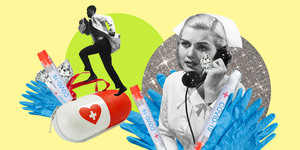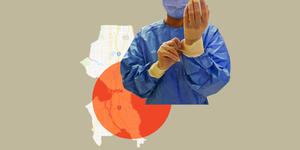Here's How You Can Help With the PPE Shortage While Staying Home
Coronavirus is expected to overwhelm our hospitals soon here in the U.S., and the shortage of PPE (personal protective equipment, aka things like masks, gloves, face shields, and gowns that medical professionals use) means we are putting those we trust to care for us when sick at risk with every new case. Not only can you help with the PPE shortage while at home, you can also support our medical professionals in other ways, like picking up their groceries while you’re also getting your own, offering to do errands, even just picking up the phone to bug your reps.
People are getting creative with their generosity. Liquor companies are now making hand sanitizer, designer Christian Siriano is making masks, and one NYC plastic surgeon, Dr. Bruce Moskowtiz, donated his only anesthesia machine (which goes for around $20,000), since it can act as a ventilator.
You may be stuck at home, but it is still possible to help our frontline medical workers without ever leaving your home (the most important and helpful thing you can do during this pandemic)!
Here are a few ways to help with the PPE shortage from the comfort of your own home.
If you have:
-Masks/Gloves
If you have any new, unused, unexpired N95 masks sitting at home, you can donate them to local organizations. (Please check! I had some from woodworking projects a few years ago that I totally forgot about!) There are lots of sites popping up that can point you in the right direction. Deaconess, an Indiana-based healthcare system, was one of the first to ask for DIY masks for themselves, and now has a handy donation-finder on their site where you can try to find a place for your donation locally. There’s also a Google Sheet with info from as many states asking for donations that I could find here. Direct Relief is another organization that is routing PPE to healthcare workers.
Your local hospital, police department, or fire department may also be able to point you in the right direction.
Even household gloves might be helpful. “If you have household cleaning gloves, donate these to hospitals. If every household donated one pair, it would be significant,” says Dr. Niket Sonpal, a NYC board certified internist.
How to safely mail masks and gloves to medical professionals:
While some of the places collecting donations are doing donation boxes (to check, call and ask what their preferred safe way of donation is —many have rules about IRL donation and rightfully so), it’s probably safer for you and everyone else if you stay home and mail it out. Print out a pre-paid postage label from USPS, Stamps.com, or any other online pre-paid shipping service. It’s also a nice idea to leave a tip for your postal carrier and any other essential workers keeping things running during these times.
It’s also a good idea to leave a tip for your postal carrier and anyone else still working during these times.
Money:
-If you don’t have actual, physical, product to donate, you can always give money! You don’t even have to open up your computer to do so! Donating money to purchase PPE supplies for smaller clinics and hospitals is also helpful, explains Sonny Patel, a public health expert at Harvard. Start with your local hospitals (a quick Goog will probs be enough) and if you want to give more, there are also crowdfunding projects like A Million Masks, explains Patel.
Time:
–Call your local reps and ask them to help with the PPE shortage. Call your local and state government and ask them to call on the federal government for help with the shortage at their local hospitals, suggests Simranjit S. Bedi, DO, a gastroenterologist in PA. “The more that the government officials hear it, the more that they will get things done!” he adds.
“The more that the government officials hear it, the more that they will get things done!”
–Call up anyone who might have PPE at home and ask them to donate any supplies. “Dentists, veterinarians, researchers in labs, construction workers, painters, or local home improvement store owners, we need for them to bring in their PPE to help us out!” says Dr. Bedi.
-Stuck at home with your parents? Go hunting through the tool shed or junk drawer for anything that might help. Lab goggles from college or high school chemistry class, any masks (new or old), and nitrile gloves, will be welcomed at Dr. Bedi’s hospital if you send to: “Attention Kathy Jaffe, 1200 W Tabor Road, 2nd floor Moss Rehab Building, Philadelphia, PA 19141.”
Note: If you’re donating expired goods, please label them and let people know they are old or expired, in a way that makes it easier for volunteers to sift through.“Hospitals will keep old/expired equipment on reserve for when the equipment they have runs out,” adds Dr. Bedi.
-Call your old high school or middle school for goggles. School’s out for the year anyways, right? Those lab supplies might as well go to good use.

-Call a nursing home. Reach out to a local nursing home or senior center and try to provide some comfort and conversation, suggests Dr. Soma Mandal, MD. “These are after all, the people who are at highest risk and they have been appropriately secluded away. But they are also lonely to begin with, and now is a good time to create connections,” she adds.
–Check in on anyone in your life in the healthcare profession. “If you have any friends who are physicians, nurses or in the healthcare field, please reach out to them and see how they are doing.” adds Dr. Bedi.”The psychological toll that this will take on all healthcare workers will be immense and they could really use the love and support right now.”
“They are fighting on the front lines and risking their own lives. Help them with the tasks you are capable of.”
–Offer to help those you know working during the coronavirus pandemic. “Call doctors and nurses you know. Ask if they need their grocery shopping done, their dogs walked or their children cared for,” says Dr. Sonpal, adding: “many of them are isolating themselves outside of work as much as possible to protect the general population. They are fighting on the front lines and risking their own lives. Help them with the tasks you are capable of.” Don’t put yourself or others in danger, but if you’re already going to be in line at the grocery store, you might as well pick something up for someone who doesn’t have time to wait in that line.

Skills:
–3D print face shields. If you have a 3D Printer at home, you can look up how to make a face shield and donate to an organization accepting them, suggests Ingrid Yang, MD, a physician in San Diego.
-Sew masks. This is a touchy subject as home-sewn masks are not near the specifications of the N95 masks, but it could be better than nothing. In an ideal world, our doctors and nurses would not need to wear home-sewn masks, but many have already started asking for them — either to give to patients without COVID-19 in order to keep the N95s for COVID-19 cases only, or to use as a “cover” over the N95 they are supposed to ration for a week.
Not every place asking for PPE is also asking for home-sewn masks, you don’t want to waste any volunteer’s time by making them sift through DIY masks they can’t use, but there are places that are asking for DIY masks. Masks4Medicine is run by an MD, and has simple instructions on how to make the style of mask they’re looking to collect. These masks will be distributed in NYC, the center of the coronavirus outbreak in the US.
Most hospitals accepting DIY face masks will have one style they prefer, so it’s best to check with hospital staff to make sure you’re creating something they can use, rather than potentially wasting everyone’s time. At Dr. Yang’s hospital which is accepting homemade masks, the specifications and requirements for quality control can be obtained by emailing one of their administrators, Christina Yates at [email protected].
-If you make DIY masks or anything to send to hospitals, channel your inner germaphobe and take extra precautions when doing so. You don’t wanna sniffle all over the homemade masks you just worked on and then do more harm than good, obviously. To keep things as clean and safe as possible, Dr. Yang suggests the following:
-Prepare healthy meals for doctors, nurses, and anyone else busy taking care of the sick. “Remember, they need to keep their immune systems boosted so protein, fruits and vegetables are best,” says Dr. Sonpal.

Connections:
-Is your BFF or your mom a plastic surgeon? Ask them to consider donating their anesthesia machine to use as a ventilator. If Dr. Moskowitz can give up his only anesthesia machine, others can too!
-Know someone who was a science teacher or works for a school? Ask if they can consider donating their school’s lab goggles.
If Dr. Moskowitz can give up his only anesthesia machine, others can too!
–Put a call out for people to donate and remind them, again, of where they can donate unused supplies.
If it feels like we’re in a World War II movie and we all have to collect scrap metal for the war effort right now, that’s because it’s pretty much happening. Our doctors and nurses and emergency responders need all the help they can get right now, and it’s all hands on deck.
Above all else:
“Finally, listen to what the CDC is telling you. We are busy ventilating people who can’t breathe. This is the job we signed up for and we are willing and able to do it. We are the people on the front lines, and it is frustrating to see those who are not social distancing and adhering to what the government is directing them to do,” adds Dr. Sonpal. “If you could see firsthand some of the suffering we have, you might reconsider gathering in a crowd because you’re bored. Please stay home so that we can flatten the curve and have enough physicians to treat the sick.”
Source: Read Full Article


